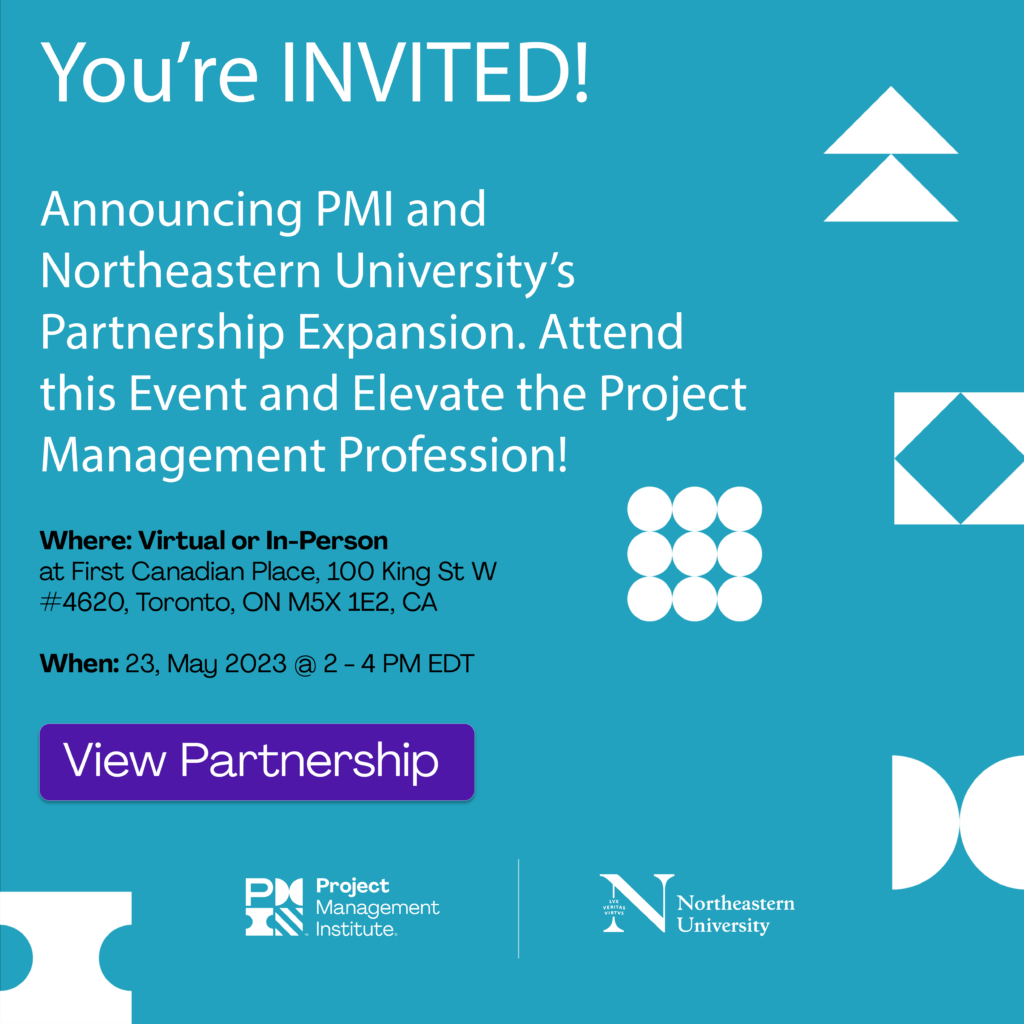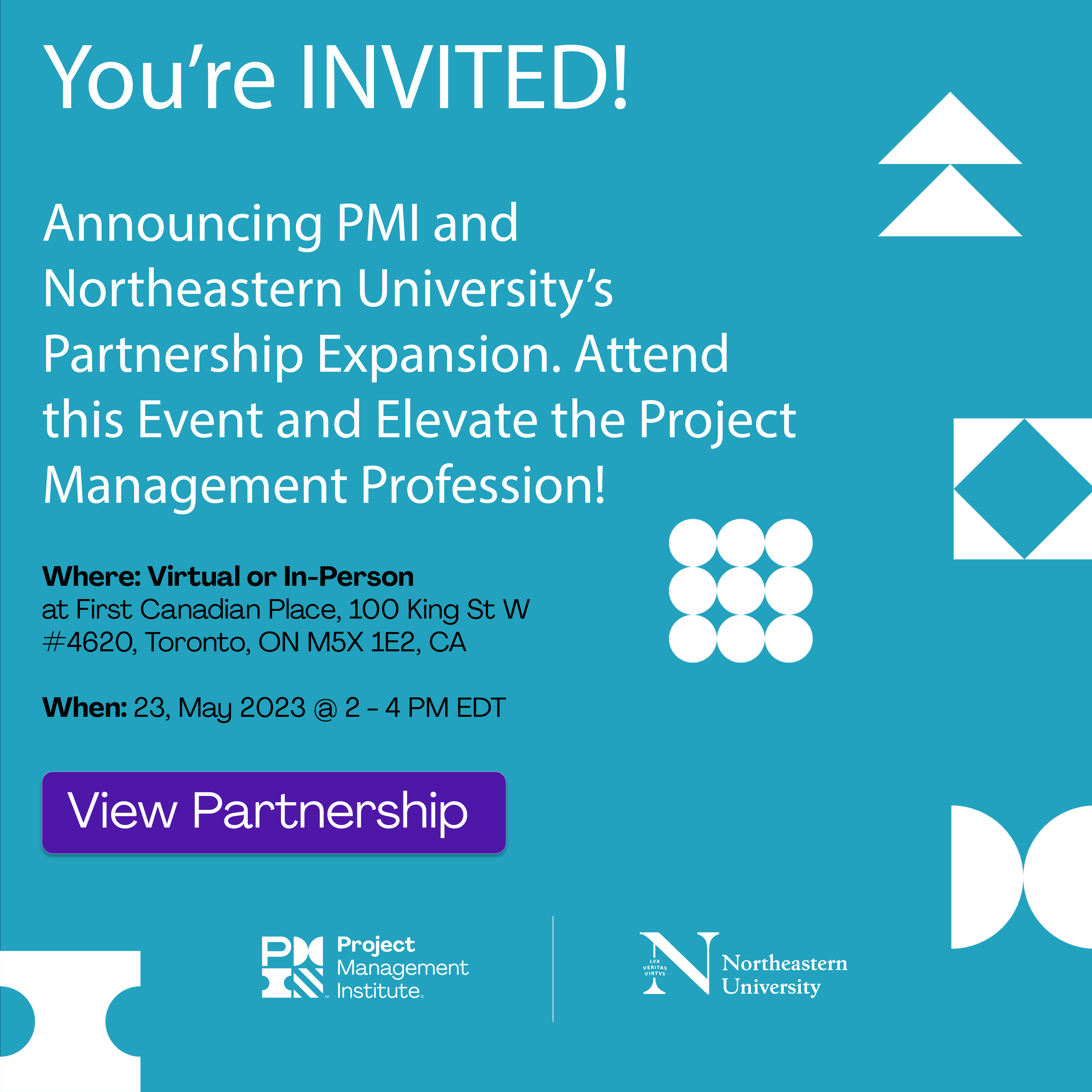Godfred Afriyie Owusu
What takeaway do you have to share about your Northeastern experience?
Be stubborn for your dreams.
College is hard. Balancing studies with life is a challenge. How have you faced these challenges and what lessons have you learned along the way?

I started my classes online due to multiple visa refusals. I finally got my Canadian visa approved for a different school and relocated to Canada. I was still schooling in Canada when I was double schooling online at Northeastern University Boston campus. Combining assignments from these two schools plus working was a hell of an obstacle that I always praise myself for coming out as the best student on top of my class.
After my Canadian degree, I decided to join my colleagues at the Boston Campus but there came the challenge that I wouldn’t qualify for Postgraduate OPT because I did all my first year online while in Canada. I was left between quitting Northeastern and saving money towards my career as an international student or taking the risk to become a Husky. I chose the latter and I have never regretted the network I have been able to build over the years including the establishment of my business.
What has your journey at Northestern revealed to you about yourself?
Let this be a reminder to all of us that no dream is too distant, no goal too ambitious. We are the architects of our future, and with perseverance, passion, and a little stubbornness, there’s no limit to what we can achieve.
Any advice for other current or prospective students?
Your dream about what you can make out of Northeastern should be higher than the obstacles you will face while at Northeastern or elsewhere.
Where do you see yourself in the future?
I love solving problems and master’s in project management gives me the exact leverage for that. Expand my business into an organization that stands as a beacon of innovation and a solution-oriented project management firm, helping organizations to find solutions to their project problems.
What other interests do you have outside of school?
ADVENTURE, SOCCER, & MOVIES.
Harshal Randad
Three words encapsulate your Northeastern University experience:
Transformative | Empowering | Diverse
What were some of the reasons you chose to attend Northeastern? What have been some of the opportunities and challenges you have experienced?

Northeastern University stood out to me for its exceptional course structure and Co-op program, which were among the many factors influencing my decision to attend. The vibrant Indian student community at Northeastern made me feel at home, further enriching my experience.
Balancing time management and networking as an international student presented notable challenges. I firmly believe in the symbiotic relationship between these aspects and actively addressed them during my time at CPS. Engaging with the diverse student body and various organizations provided valuable opportunities for involvement. As Head of Events at NU Sanskriti, I led initiatives within the community. Additionally, my role as an Event Assistant at the University Advancement Department allowed me to further develop my skills. Through effective task prioritization, I successfully managed my responsibilities, benefiting from the abundant resources available at Northeastern University.
What has your journey at Northeastern University revelated to you about yourself?
My journey at Northeastern University has revealed several insights about myself. First, I’ve discovered a heightened sense of adaptability and resilience, navigating new environments and challenges as an international student. I’ve learned to embrace uncertainty and thrive in diverse settings, fostering a greater sense of independence and self-reliance.
Furthermore, my experiences at Northeastern have reinforced the importance of effective communication and collaboration. Engaging with a diverse student body and participating in various organizations have honed my interpersonal skills, allowing me to build meaningful connections and work effectively in team settings.
My time at Northeastern has underscored the significance of perseverance and continuous self-improvement. I’ve encountered obstacles and setbacks along the way, but I’ve learned to approach them with determination and a growth mindset, striving to overcome challenges and achieve my goals.
What advice do you have for others considering higher education — either at Northeastern or elsewhere?
- Embrace opportunities. Be open to new possibilities and experiences, even if they initially seem daunting or unfamiliar. Consider recommendations from trusted sources and explore opportunities for personal and professional growth.
- Perseverance and resilience. Recognize that challenges may arise along the way but believe in your ability to overcome them. Draw inspiration from your own journey of resilience and determination, knowing that perseverance is key to achieving your goals.
- Seek support and resources. Utilize the resources and support available to you, whether it’s from family, mentors, or educational institutions like Northeastern University. Take advantage of co-op programs, dedicated faculty, and diverse student communities to enhance your learning experience and expand your network.
What interested you in the degree you pursued?

I completed my Master of Science in Project Management with a concentration in Agile. Drawing from my four years of experience in the IT industry, I progressively gravitated towards project and team management. Recognizing my aptitude for this field, I decided to elevate my skills to an advanced level, capitalizing on my strengths.
What are you hoping to do after you graduate? Where do you imagine yourself 5 years from now?
I’m looking forward to applying the skills and experience I gained at Northeastern as I join Convergint Technologies as a Project Coordinator. But this is just the start of many achievements I’m looking to gain in the future where I see myself heading a global and diverse portfolio department and of course to relate to Northeastern as a proud Husky alumnus. I want to keep helping other students like me.
We know you are more than the person who shows up at Northeastern — what are some of your hobbies and other passions? Where do you find your joy?
I enjoy dedicating time to daily gym sessions, prioritizing my physical well-being amidst other responsibilities. One of my passions lies in aiding individuals who seek assistance, whether it’s securing part-time campus employment or overcoming challenges. Over the past two years at Northeastern University, I’ve taken on active roles in organizing various events such as Giving Day, Fall Fest, and Commencement.
My leadership position at NU Sanskriti has allowed me to spearhead cultural celebrations like Deepavali and Holi. I find immense joy in the company of my loved ones, cherishing quality moments together regardless of the setting or circumstance.
Anything else you’d like to add?
I have read somewhere that most people fail NOT because they set goals that are too high and that they don’t accomplish them. But rather they set goals that are too low, and then they accomplish those. Most people end up leaving potential on the table because they don’t set goals that are ambitious enough. We shouldn’t shy away from big goals because we are afraid of failure. We need to let our school experiences be a reminder that in pursuit of these dreams, it’s okay to fail, and it’s okay to struggle because it is this dark moment that gives us the fuel to do great things.
JUST KEEP GOING & HAVE FAITH IN YOU.
PMI and Northeastern University Launch New Partnership, More Opportunity and Value for Project Management Learners
Northeastern University’s College of Professional Studies (CPS) is pleased to announce an exciting new offering from its existing partner, Project Management Institute (PMI). PMI is offering a 30% discount on either the Project Management Professional (PMP) or the Certified Associate in Project Management (CAPM) certification, as well as a discounted student membership to the organization and connection with local PMI chapters. These discounts are available to all Northeastern students interested in leveraging these valuable certifications to further their careers in project management.
An in-person kickoff event to celebrate the enhanced partnership is scheduled for Tuesday, May 23, from 2 to 4 p.m. and will take place on the Northeastern Toronto campus. Virtual attendance at the event is open to all Northeastern students throughout its global campus network. Registration can be accessed here.
The Northeastern CPS Master of Science in Project Management Program is accredited by the PMI Global Accreditation Center for Project Management Education Programs (GAC). In October of 2021, the Master of Science in Project Management accreditation was re-affirmed for the maximum five-year accreditation cycle (originally accredited in 2009) by the PMI Global Accreditation Center for Project Management Education Programs (GAC), the world’s leading association for Project management professionals. Accreditation is achieved by meeting the GAC’s rigorous standards, which include an assessment of program objectives and outcomes, a review of onsite and online resources, evaluations of faculty and students, and proof of continuous improvements in the area of project management.
Adel Zadeh, Associate Teaching Professor of Project Management, says, “As CPS continues to focus on student success, this partnership brings tremendous value to our students and program and extends their impact across our global network. By aligning with PMI Global, students gain invaluable access to PMI’s vast resources, including cutting-edge methodologies, best practices, and a global community of professionals. This partnership bolsters their academic experience and equips them with the practical knowledge and credentials required to excel in real-world project management scenarios while standing out in a highly competitive job market.”
About PMI
Project Management Institute (PMI) is the leading professional association for project management and the authority for a growing global community of millions of project professionals and individuals who use project management skills. Collectively, these professionals and “changemakers” consistently create better outcomes for businesses, communities, and society worldwide.
What is PMP & CAPM Certification?
PMI created Project Management Professional (PMP) Certification to recognize project managers who have proven they have the skills to successfully manage projects. Project Management Professional (PMP) certification represents an elite group of project managers that are valued and recognized by thousands of employers globally. It proves project leadership experience and expertise in any way of working, and it signals that recipients are highly skilled in people, processes, and business environment goals and objectives.
The Certified Associate in Project Management (CAPM) Certification is a globally recognized credential that opens the door to opportunities at every career stage in the field of project management. The current CAPM certification involves taking an exam that tests your aptitude in: Fundamentals of project management and the role of project managers, Project management environment and project integration management, Project scope, schedule, cost, quality, and resource management, Project procurement, communication, stakeholder and risk management. The CAPM certification is a typical first step in building a career as a project manager.
Project Management Institute (PMI) resource page: Click here
PMI Global and Northeastern University Partnership Launch
The Project Management Institute (PMI) is the world’s leading project management organization. Now Northeastern students will be able to access discounts for PMI certifications, including Project Management Professional (PMP) and Certified Associate in Project Management (CAPM).
This special event will highlight the collaboration between PMI and Northeastern, how to take advantage of the partnership, and showcase the advantages of PMI certification
Meet the CPS Lecture—Making Connections in Project Management
Making Connections in Project Management: What professional project management is, why companies are investing in it, and how you can grow your career.
Northeastern University in Arlington is pleased to host a Taster Lecture with the College of Professional Studies focusing on our Master of Science in Project Management.
In this class, you will have the opportunity to hear a brief overview of the discipline, why it matters, and where it is growing. You will also learn how the College of Professional Studies offers an accessible but effective degree to give students the skills they need to join this growing revolution.
After a presentation in the main room, attendees will be able to learn more about specific areas of project management in small group conversations with Northeastern faculty members in breakout rooms. Enrollment counselors and academic advisors will be available in the main room to answer questions about applying and getting started in the program.
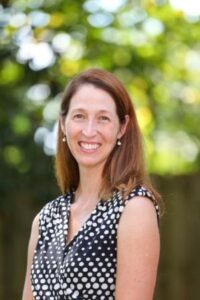
Workshop facilitator: Shannon Alpert
Dr. Shannon Alpert spent the first 15 years of her career leading projects and teams responsible for creating learning solutions in the telecommunications and financial services industries. She also consulted with K-8 and higher education organizations on project and portfolio management while also teaching online graduate courses at the University of North Carolina at Charlotte.
Dr. Alpert joined Northeastern University’s College of Professional Studies at the end of 2014 and served for over 6 years in the Doctor of Education (EdD) program. She was the lead faculty for the Integrative Studies concentration of the EdD program, principal instructor for the Advanced Research Design course, and dissertation chair for over 30 doctoral research projects. In 2021, Dr. Alpert joined the Professional Programs domain as a principal instructor for the Bachelor of Science in Project Management. In 2022, she became Faculty Lead for Project Management programs, including the Master of Science in Project Management, Bachelor of Science in Project Management, and graduate certificate programs.
We will also have time for a Q&A, so bring any questions you have for Shannon Alpert.
Easing Supply Chain Disruptions With Informed Decision Making
Recent global shocks such as the COVID-19 pandemic and the war in Ukraine have exposed the fragility of the global supply chain. Northeastern University-Toronto sat down with Ammar Aamer, associate teaching professor in the Master of Science in Project Management program at the College of Professional Studies, to talk about the role that digitalization can play in increasing the resiliency of the supply chain—and the exciting research that he and his students are conducting in this critical area.
The COVID-19 Outbreak in India Hit Hard in His Hometown. So He Built a Hospital There.

CPS Project Management student Jason Peter worked through the night the past few weeks to develop a COVID-19 hospital in his native Bangalore, India — an inspiration that took form from his capstone project.
The hospital, which will be called the Rapha Care Center, will open on July 1. The five-floor building will provide 130 beds and at least four ventilators. Peter’s team hopes to treat 400 patients per month.
In a First, Regional-Campus Student Wins Leadership Award
Puneet Kundu (MS ’22) has become the first student at a regional campus to receive Northeastern’s 2021 Graduate Student Award in Leadership. The award recognizes graduate students who have demonstrated significant leadership and a deep commitment to giving back to members of Northeastern’s community or surrounding neighborhoods. One of two students across the university to be recognized this way, Kundu joined Theresa Davenport, a PhD student in Ecology, Evolution, and Marine Biology at Northeastern’s Marine Science Center, in garnering this year’s honors.
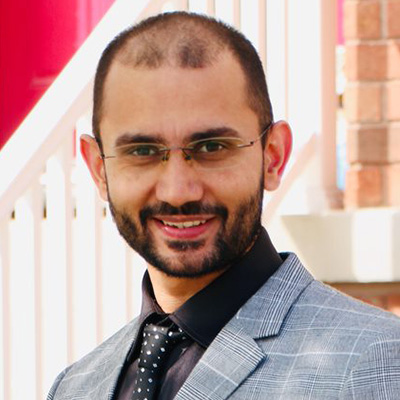
Kundu was part of the first international student cohort at the Toronto campus, beginning his studies online in April 2020 in the project management program and arriving in person in the summer of 2020. Even before leaving his home country of India for Canada, Puneet had begun planning a Toronto chapter of the Northeastern Project Management Student Organization. Working with other students at the Toronto campus, as well as Professor Adel Zadeh, Puneet succeeded in establishing this group and mounting a series of successful student events. These included events focused on helping newly arriving students settle in Toronto and events helping project management students navigate the concentrations available to them in their program.
Kundu is an assistant director of the Toronto chapter of the Project Management Institute. He has also worked as a student ambassador for the College of Professional Studies, connecting with prospective project management students to provide a student’s perspective on the degree and the Toronto campus experience. He has also demonstrated leadership and commitment to the community in less formal capacities, including personally delivering groceries to newly arrived students in quarantine.
“Puneet’s accomplishments would be impressive under any circumstances,” Chief Executive Officer and Regional Dean of Northeastern University Toronto Aliza Lakhani said in a letter to the Northeastern community. “Given the unprecedented challenges created by the pandemic, however, they are even more noteworthy. Puneet and his fellow students have demonstrated remarkable initiative, creativity, and resilience under very difficult circumstances.”
Tackling Life and Learning with Resilience and Bravery
24-year old Master’s student Chethan Kumar BM knows about taking decisive action on a magnitude that few of his peers have experienced. Two years ago, in Chethan’s hometown of Bengaluru, a southern city dubbed the “Silicon Valley” of India, a pair of Hawk MK-132 jets practiced for a military air show. Suddenly, due to a piloting error, they collided in mid-air.
Chethan, a fourth-year aeronautical engineering student at the time, was watching the rehearsal from his window at home when the accident occurred. Living only feet from the airbase, he ran to aid the pilots and remained on the scene, assisting and reassuring them until paramedics and emergency personnel arrived. Two of the three pilots survived, and Chethan’s immediate action before ambulances attended is credited in saving their lives.
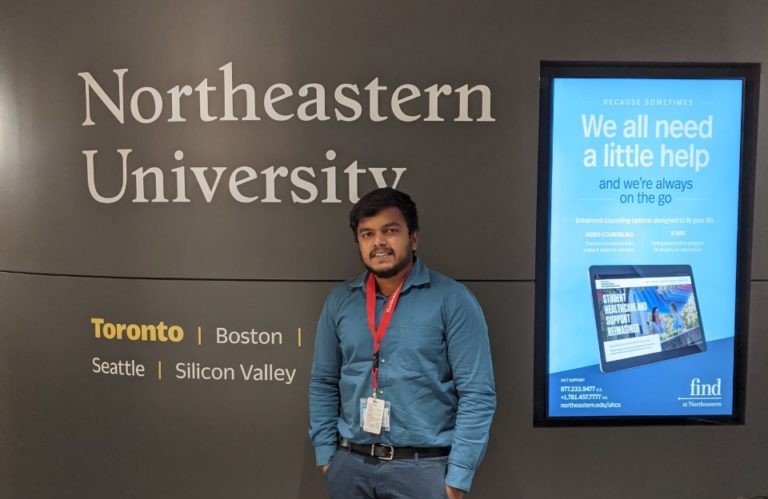
“People close to me always said that I was good at decision-making, especially in critical situations.” Some also suggested, “Why not hone that skill professionally?” This advice, coupled with his innate interest in making key decisions, led Chethan to start researching a Masters of Science in Project Management at Northeastern’s Toronto campus.
Student Spotlight: Sunny Rodrigues
How an idea that started as a way to gather a couple dozen CPS students over coffee turned into an event with over 250 attendees.
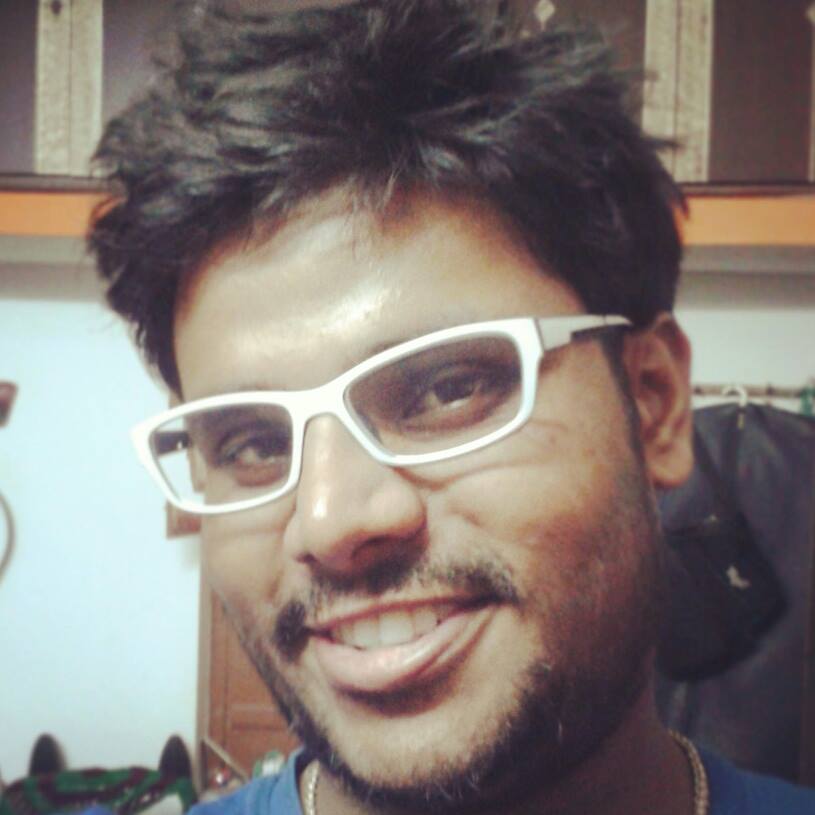
Sai (Sunny) Rodrigues came to Northeastern from India in January, 2017 to complete a Master of Science in Project Management. “I looked up Northeastern and it came up as one of the most innovative schools. For project management, you require innovation to come up with different ideas,” Sunny said when asked why he chose Northeastern. “I hate redundant work. I really felt that Northeastern was the most compatible with my own views.”
Sunny’s decision was soon validated—he found he loved both Northeastern and his studies. But he also noticed an opportunity for more student events, and was determined to help grow that community.
The College of Professional Studies, where Sunny is a student, is known for its flexibility and diversity. Students of all ages take courses online, on-ground on the Boston campus, or through Northeastern’s regional campuses—meaning the student body is spread out across the country, and beyond.
Additionally, with a large international population, many students are starting a new phase of their life in a new country. And due to limitations on international students working in the U.S., Sunny found that many of his peers had more free time between classes and coursework than they expected.
Northeastern offers myriad extracurricular events, and lectures, among other things, for students to attend. These are all open to CPS students, but Sunny felt that CPS students weren’t always aware of these events, something he wanted to help remedy. He also saw an opportunity to organize events geared towards the unique population of CPS.
Sunny decided to work toward creating more opportunities for CPS students specifically to gather on the Boston campus. He took a position on campus as a Community Ambassador for Off Campus Student Services. He went to every department on campus asking what they offered CPS students in terms of events and extracurriculars. He then began a WhatsApp group called “What’s Happening Around Where,” or WHAW. Using this platform he began sharing posters of campus events with other students.
Thanks to Sunny’s role as a Community Ambassador, he also started meeting many more students, broadening his network around Northeastern and eventually growing his WhatsApp group to over 1,800 students.
He continued his mission when he started a new position as program assistant at the Northeastern Center for Intercultural Engagement in January 2018. He believed that this role would give him the ability to help grow the community for students even further. To that end, Sunny had a meeting with Karin Firoza, director of Center for Intercultural Engagement and told her his goal of organizing more CPS community events.
He also went to a trusted professor, Mary Ludden, an assistant teaching professor in project management, who told him to follow his gut. “She told me I have a great position right now [at Center for Intercultural Engagement] and that I should turn my ideas into actions.” Ludden’s support gave him the push he needed to start making strategic moves for change. “I went back to Karin and she agreed that Center for Intercultural Engagement needed to host an event for CPS students.”
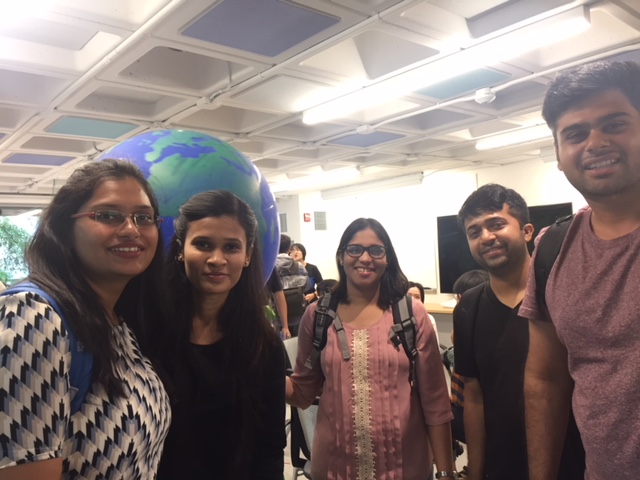
While Sunny was planning what he wanted the event to look like, he was also meeting with Kristen Lee, an associate teaching professor in behavioral science at Northeastern. Professor Lee agreed to spearhead the event now titled “Coffee and Convos” and speak about imposter syndrome, or the feeling that you are a fraud, despite evidence to the contrary. It was a topic that hit home for Sunny and one to which he felt that many of his peers could likewise relate.
Sunny created a flyer, sent it to his 1,800 contacts via WhatsApp, and placed flyers around CIE and Nightingale Hall. The turnout for the first Coffee and Convos was significantly beyond what they expected. “There were more than 280 people standing in Center for Intercultural Engagement —that was such a great moment for me,” Sunny recalled. The turnout validated that this population of students was thirsty for more opportunities to gather together and learn.
Sunny Rodrigues has spent his time at Northeastern helping to grow the CPS community around the Boston campus. Coffee and Convos turned into a series, where professors, faculty and students could get together to discuss imposter syndrome and what that means to the CPS population. The sessions became gatherings where students could make connections and become a part of the larger community.
While Sunny set out to come to the U.S. and complete his Master’s in Project Management, he has achieved far more than just a degree. He has built a network of students that has coalesced around common interests and backgrounds.
Sunny is graduating December 2018, but plans to continue to be a part of the Northeastern community as an active alumnus and hopes to return one day as a faculty member.
